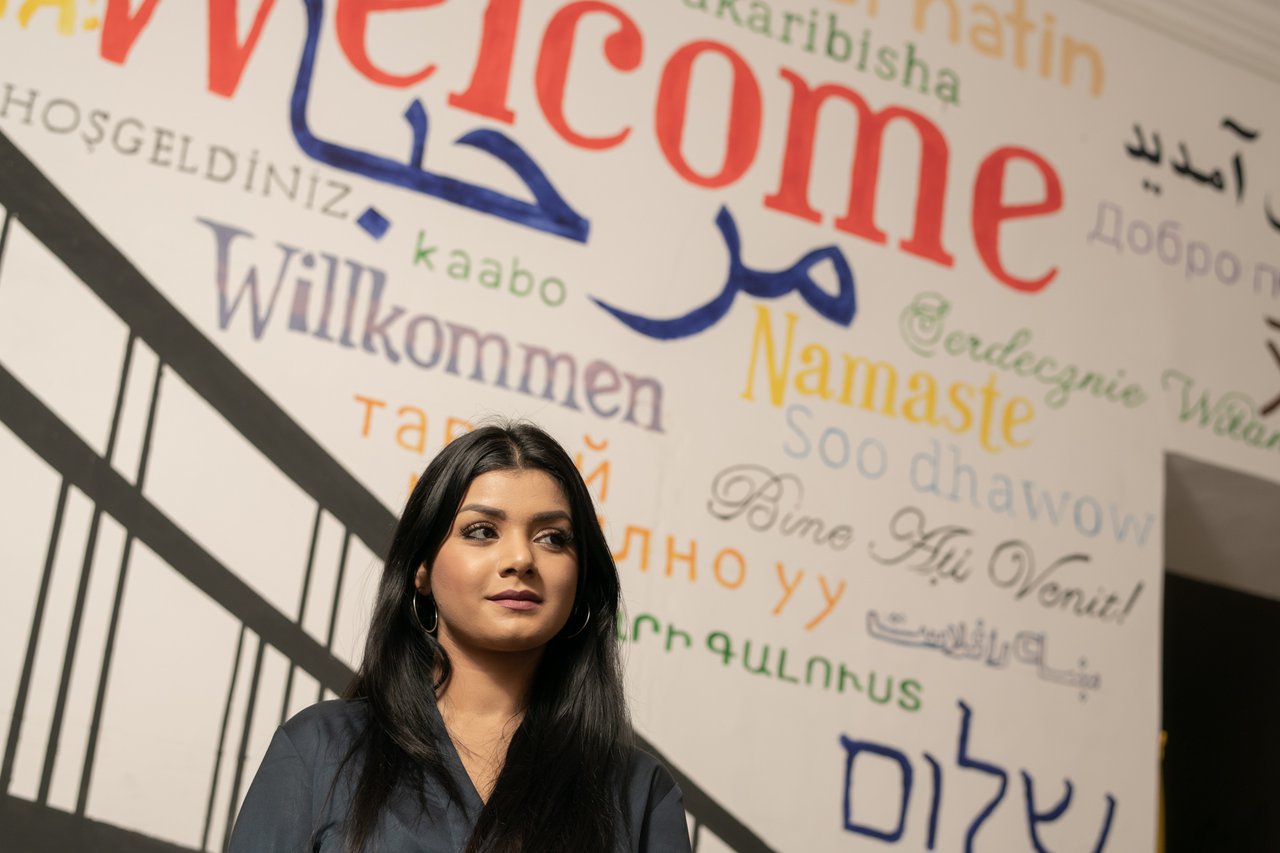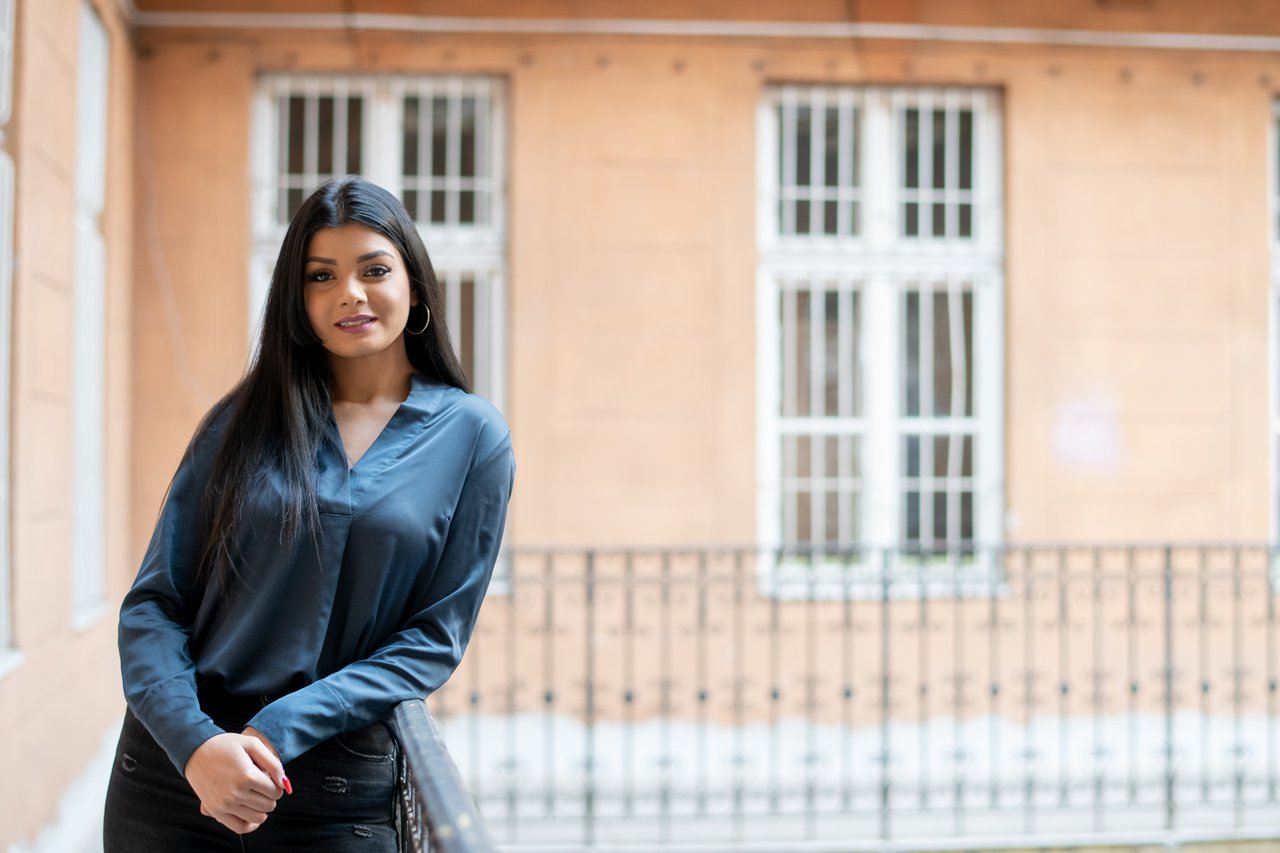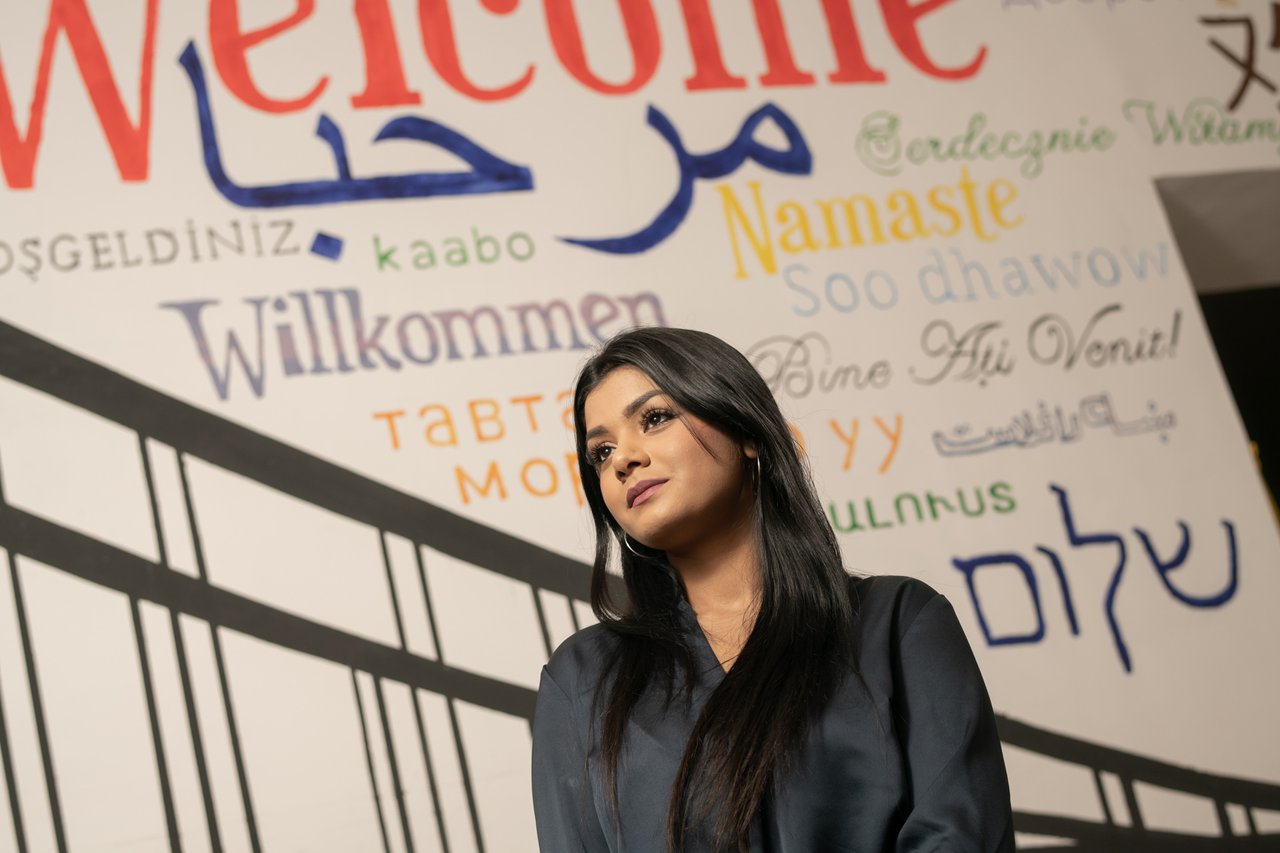
Pakistani and Hungarian, but above all: Christian. This is how Angela Canadey - who arrived in Hungary as a refugee with her family - speaks about herself. Since then, she has become a Hungarian citizen, and she currently serves as a member of the refugee integration unit of RCH’s Diaconal Office. She previously worked as an interpreter and as the assistant to the Pakistani ambassador, but she thinks her most important task is building the Kingdom of God. This is why she accepted the position of substitute member in the Executive Committee of Churches Commission for Migrants in Europe (CCME).
You arrived 16 years ago, as a child. How do you remember this period?
I was eight years old when I arrived here, and as a child I really enjoyed that I could be in Europe, moving and playing freely. My mom came here first, and then nine months later, me, my dad, my brother and my younger sisters followed her. We arrived in August of 2005 and I can't describe how good it felt to see my mother again, and that the family was finally together. A few weeks later school started, I had a lot of tasks, but being a child here felt different from how it felt in Pakistan. In Hungary I was more relaxed.
How was your childhood in Pakistan?
I 've experienced that as a child you don't really notice the differences between religions. I was able to go to school - for which I consider myself lucky, because not everybody can - and on top of that I went to a Canadian Christian school, where we started each day with a prayer. I spent these years in a bubble. I saw differences, I had classmates from different religious background, but I didn't know how big these differences were. Christians aren't really in a good situation in Pakistan. They can't pray freely, and although they can live out their religion, they have to pay attention to the Muslim rules. If there's a conflict they can be sentenced to death easily. This is why my parents decided to move, they hoped that we could grow up safely.
Christ’s Love from Above
The Presbyterian organisation Tehillim Pakistan has started a food supply campaign for day labourers and marginalized poor Christian families amidst of COVID-19 lockdown in Karachi. Also Muslim families in need received food packages and support.
Why did you choose Hungary?
I don't know but looking back I think the answer is that it was God's will. Looking at our life I can see that we had to arrive here, because this is where I've found places where I can serve God. I am not looking for answers for why we came to Hungary anymore, I am just happy that I can be here.
What were the first years in Budapest like?
It was really hard for my mother while we couldn't be with her. She experienced being a refugee alone in a foreign country. While we were already looking for opportunities to serve God, she continued it here, and after we arrived, she already knew how it is to be alone, so she started a home group for Pakistani refugees and for these who were seeking to serve God. This community was growing constantly, we talked a lot each time we met, always had a teacher who reflected about God's Word, and we always sang Christian songs. It didn't matter that we spoke different languages, the melody was the same, and we knew that we are singing the same. Sometimes there were so many of us together, that we had to find a bigger place. We found it important to let everybody who is interested come, not only believers. This way we could show them what a Christian community is like. Many came because of this community, and they felt comfortable talking and making friends.
Your family moved to the Netherlands a few years ago. Why did you find it important to stay here?
It was a really hard decision for me. One thing is that I’ve already started university, majoring in International Relations, and I wanted to finish my studies, not moving and starting all over again. I’ve also felt that God has a plan with me staying here. In my culture there’s no such thing as a young, unmarried woman living alone, so it was a huge challenge at home. I prayed for weeks to make God’s will happen, not mine, and I couldn’t believe when my parents agreed. I was already working back then as a university student, so I was able to live by myself, and besides God has already taught me through the years that one can serve in so many ways. Everybody is talented at something. God could use me through my knowledge in languages. It was very important to me to translate in the Immigration Office and help Christian Pakistani families during their interviews. I’ve felt that I can serve God with this the most, because the plan for me is to help others.

What kind of tasks did you have as an interpreter during refugee interviews?
Many Christian escaped from Pakistan to Hungary and when they arrive, they have to go through a couple of interviews. It is very rare to have an interpreter who has the same religion, but because I am Christian too, they could open up easier. Although they have to answer to some basic questions about Christianity, the use of words and pronunciation is very important. If the interpreter doesn’t know these words, the family can get into a lot of trouble and the whole asylum procedure can fail. During the interview they tell us why they left their home, what happened to them, but for a successful conversation there has to be trust, use common expressions and most importantly common language. First I thought that I was able to work flexibly while studying, but then I realized that this is much more requiring. As more and more families arrived, I understood, that my place is here. I felt that I am part of God’s bigger plan, this is why everything turned out like this, this is why I stayed in Hungary.
How did you come in contact with the Reformed Church in Hungary?
We were the first family participating in the housing program by the Refugee Ministry of the Reformed Church in Hungary, and I also received help for my high school studies from their school integration program for a few years. A few years ago, I started interpreting at the Refugee Ministry, and my knowledge in Urdu, Panjabi, English and Hungarian was a huge help for them. I was able to help Pakistani and Afghan refugees too, but also anybody, who could speak even a little English. Then, thanks to HEKS, the Swiss Interchurch Aid, I have had an opportunity to work at the Refugee Integration Unit at the Diaconal Office. By that time, I had finished my studies, so I joined the program. I came at the end of the last 4-year cycle of the so called Country Program, and the new project just launched. I think it is very convenient that my mother tongue is Panjabi, because I am helping families at Kalunba Nonprofit Ltd., the implementing partner of RCH's Refugee Ministry, who have the same mother tongue. It doesn’t matter if they speak Urdu – the national language – they can express themselves better in Panjabi.
As the nominee of RCH, the Churches Commission for Refugees in Europe (CCME) elected you as substitute member in the Executive Committee.
I was surprised, but I think it’s a great opportunity, because I have always wanted to work and serve in a position like this. I felt like it was God letting me see better how the world actually works, so accepted it happily. I am learning a lot and I can see what kind of tasks can be done to make things better. Normally, they would have three meetings in a year in different countries, but the substitute members only attend if someone is not able to attend the meeting. But now because of the pandemic, we hold everything online, so everybody can attend. It’s really good to see how prepared the older, more experienced members are, and it is such a joy to learn from them. In the group there are different theologians, church leaders, social workers, and refugee field workers, so we can have a whole picture of the complex field of ministering refugees.
You knew a lot of cultures, countries and languages. What are your opinions on national identity?
I could talk a lot about this, because it is a question that connects to the culture I grew up with, my roots. Even if I have been living in Europe for sixteen years, I interact with the Pakistani culture a lot, but at the same time I am free to live according to my Christianity. When I was a child, I was thinking about how big the cultural differences are, because even though my family is Christian, our culture is Pakistani, which is based on the Islam. I’ve learned that even as Christians, everybody has their own cultural background, and mine was already influenced by the European and Hungarian culture, so it would be really hard to separate them. This is why I feel like I am a Pakistani Christian, who is also Hungarian, but I can’t – and maybe I don’t have to – tell the percentage. For me, my Christian identity is the most important. I saw different countries, different cultures, but I can only live like a citizen in the Kingdom of God in Christian communities, and this exceeds differences in culture and nationality.

Besides that it is the most important to you, what does Christianity mean to you?
It is my life, the source of my thinking or at least I am trying to live according to this. This is how I grew up, but as an adult I know, that I am not Christian because I was raised like this, but because I have a constant, living relationship with God. God was the one who always answered my questions. I always wondered that if I start living alone, leaving the Christian “bubble”, would my faith change or would it stay the same. I knew that it would come to light if I will follow God by myself. Nothing changed, so my faith didn’t depend on my family. I learned a lot from this solitude, especially that God is protecting me and to be Christian is life itself.
What is the most important experience in this journey?
If I look back at my life, I can always see God’s guidance, and I know that I can’t thank myself for these accomplishments. Often such things are happening daily which I feel like I don’t deserve, and I can’t be grateful enough for them. This constant guidance strengthens my connection to God, who I know to be capable of even greater wonders.
Originally published in Reformátusok Lapja, the Weekly Magazine of RCH
Translated by Csenge Kiss; Proofread by Claire Weihe
Read more about the Refugee Ministry of RCH
The Refugee Ministry of the Reformed Church in Hungary is organized under the Unit for Refugee Integration, which is part of the RCH’s Diaconal Office and works with Kalunba Social Services Nonprofit Ltd. as implementing partner. Get to know our vision, strategy, organisation, structures, cooperations and read the latest news.